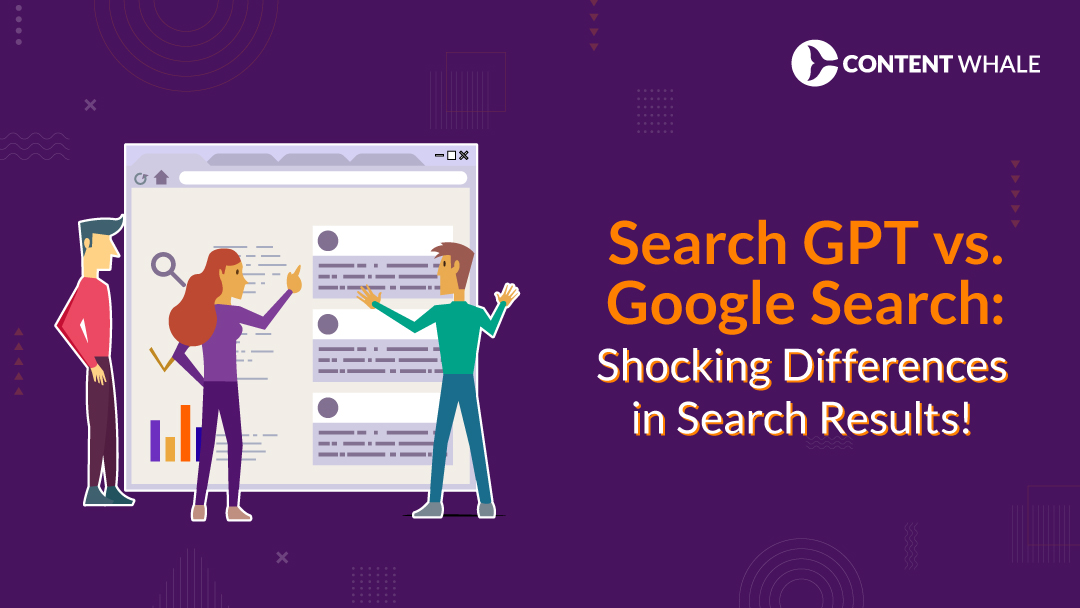SearchGPT is revolutionizing the way we search online, offering a conversational, AI-driven approach that aims to deliver personalized, relevant answers instead of just links.
Developed by OpenAI, SearchGPT marks a significant step forward in AI-powered search, sparking discussions around SearchGPT vs. Google and how each uniquely serves user needs.
While Google has long been the leader with its extensive Google AI search features, Search GPT shifts the focus toward more interactive, context-aware responses.
This comparison between SearchGPT features and Google’s established capabilities reveals how AI technology is influencing search engine trends. Understanding this shift not only benefits everyday users but also offers insights for businesses and marketers navigating new AI in search possibilities.
1. Introducing SearchGPT
SearchGPT, developed by OpenAI, represents a significant advancement in the field of AI-powered search. Unlike traditional search engines that rely on keyword matching, SearchGPT utilizes advanced language models to understand and respond to user queries in a conversational manner.
a) Key Features of SearchGPT:
- Conversational Interface: SearchGPT offers a user-friendly, conversational interface, allowing users to ask questions naturally and receive direct, context-aware responses.
- Real-Time Data Integration: By integrating real-time information, SearchGPT provides up-to-date answers, enhancing the relevance and accuracy of search results.
- User-Centric Design: Focusing on user intent, SearchGPT delivers personalized responses, improving the overall search experience.
2. How SearchGPT Differs from Google Search
The emergence of SearchGPT introduces a new dynamic in the search engine landscape, prompting a detailed comparison between SearchGPT vs. Google. Understanding their differences is essential for users seeking the most effective search experience.
a) Conversational Interface vs. Traditional Search
- SearchGPT: Utilizes a conversational search approach, allowing users to input queries in natural language and receive direct, context-aware responses. This method enhances user engagement and simplifies information retrieval.
- Google: Employs a traditional search model, where users enter keywords and receive a list of relevant links. While effective, this approach may require users to sift through multiple sources to find specific information.
b) Direct Answers vs. List of Links
- SearchGPT: Focuses on providing concise, direct answers to user queries, reducing the need to navigate through various websites. This feature is particularly beneficial for straightforward questions.
- Google: Offers a comprehensive list of links, giving users access to a wide range of sources. This method is advantageous for in-depth research but can be time-consuming for simple queries.
c) Real-Time Data Integration
- SearchGPT: Integrates real-time data, ensuring that responses reflect the most current information available. This capability is essential for queries related to news, stock prices, or live events.
- Google: While Google provides timely information, it relies on indexed pages, which may not always capture the latest updates. However, Google’s extensive indexing offers a vast repository of information.
3. Head-to-Head Comparison: SearchGPT vs. Google Search
The debate between SearchGPT vs. Google showcases how each platform addresses user needs with distinct strengths.
By comparing SearchGPT and Google Search on factors like user experience, accuracy, and efficiency, we can better understand which AI-powered search might suit different user preferences.
a) User Experience and Interface
- SearchGPT: Known for its conversational search interface, SearchGPT enables users to ask questions naturally and receive direct, context-aware answers. This personalized approach appeals to users looking for a quick and interactive experience, setting Search GPT apart in the SearchGPT vs. Google search comparison.
- Google Search: Google retains its traditional structure, where users type in keywords and receive a list of relevant links. Although effective, this format often requires sifting through multiple results. In the Google vs. SearchGPT conversation, Google’s approach serves users who prefer exploring diverse sources.
b) Search Accuracy and Relevance
- SearchGPT: Using sophisticated AI algorithms, SearchGPT aims to understand user intent closely, delivering precise, targeted answers. However, as an emerging tool, its accuracy is still influenced by the extent and quality of real-time data integration and training.
- Google Search: With years of data refinement, Google’s algorithms ensure highly relevant results, thanks to vast indexing and updates. This approach has made Google the benchmark for AI search engine accuracy, a key point in the Search GPT comparison.
c) Response Time and Efficiency
- SearchGPT: Designed for efficiency, SearchGPT quickly provides direct responses without requiring users to browse links. This feature makes it ideal for simple, direct questions where quick answers are preferable.
- Google Search: Google’s response time is equally fast, but its broad listing approach may require additional navigation. For in-depth research, Google’s format gives users access to a wealth of information from different perspectives.
Detailed comparison between SearchGPT and Google Search:
| No. | Feature | SearchGPT | Google Search |
| 1 | Search Approach | Conversational AI providing direct, context-aware answers | Traditional keyword-based search yielding a list of relevant links |
| 2 | User Interaction | Engages users in a dialogue-like manner | Requires users to sift through multiple sources |
| 3 | Data Integration | Incorporates real-time data for up-to-date responses | Relies on indexed pages, which may not always reflect the latest information |
| 4 | Response Format | Offers concise, direct answers | Provides a comprehensive list of links for users to explore |
| 5 | Search Accuracy | Accuracy depends on AI training and data quality | High accuracy due to extensive indexing and sophisticated algorithms |
| 6 | Response Time | Delivers quick, direct responses | Fast retrieval of a wide array of sources |
| 7 | Advertising Model | Limited traditional ad placements due to direct answer format | Integrates ads within search results, offering various advertising opportunities |
| 8 | Content Optimization | Requires content specialized for conversational queries | Optimizes content for keyword-based searches |
| 9 | Personalization | Provides personalized responses based on user interaction | Offers personalized search results based on user history and preferences |
| 10 | Multimedia Integration | Primarily text-based responses | Integrates images, videos, and other multimedia elements in search results |
4. Impact on SEO and Digital Marketing
The rise of AI-powered search engines like SearchGPT is reshaping SEO and digital marketing strategies. Understanding these changes is essential for businesses aiming to maintain visibility and engagement in this evolving digital world.
a) Shifting SEO Strategies
- Content Optimization: With SearchGPT focusing on conversational search, businesses must create content that aligns with natural language queries. This involves incorporating long-tail keywords and addressing specific user intents to improve search rankings.
- Structured Data Implementation: Utilizing structured data helps AI search engines understand and present content effectively. Implementing schema markup can enhance visibility in search results, especially in SearchGPT’s direct answer format.
b) Advertising and Monetization
- Ad Placement Adjustments: The SearchGPT vs. Google comparison reveals differences in ad placements. While Google integrates ads within search results, SearchGPT’s direct answer approach may limit traditional ad opportunities, prompting marketers to explore alternative advertising methods.
- Sponsored Content Development: Creating high-quality, relevant sponsored content that aligns with AI search trends can attract organic traffic and engagement, compensating for potential reductions in traditional ad visibility.
5. The Future of Search: What Lies Ahead?
The competition between SearchGPT and Google Search is reshaping the AI search engine world, leading to significant advancements in how users interact with information online.
a) Predicted Trends in AI Search
- Enhanced Conversational Interfaces: The rise of conversational search models like SearchGPT suggests a future where users engage with search engines through natural language, receiving more intuitive and context-aware responses.
- Integration of Multimodal Data: Future AI-powered search platforms are expected to process and integrate various data types, including text, images, and videos, providing more comprehensive search results.
- Personalization and User Intent Understanding: Advancements in AI in search will likely lead to more personalized experiences, with search engines better understanding individual user preferences and delivering specialized content.
b) Implications for Users and Businesses
- For Users: The evolution of AI search trends promises more efficient and accurate information retrieval, reducing the time spent sifting through irrelevant results.
- For Businesses: Companies must adapt their digital marketing and SEO strategies to align with the capabilities of AI search engines like SearchGPT. This includes optimizing content for conversational queries and leveraging AI tools to maintain visibility in search results.
6. Enhance Your AI Performance with Content Whale’s Expertise
AI-driven search engines like SearchGPT signify the future of information access. Embracing AI as a partner enables faster, intuitive responses, transforming data into actionable insights for personal and professional advancement.
Leveraging Content Whale’s Expertise
To optimize AI performance in this shifting environment, partnering with specialists like Content Whale can be beneficial. Our services include:
- Data Annotation: We offer high-quality data annotation services, ensuring AI models are trained on accurate, context-relevant data to improve overall performance.
- Scalable Solutions: Our team specializes in scaling data annotation projects efficiently, maintaining high standards of accuracy and cost-effectiveness—key to supporting successful AI outcomes.
- Industry-Specific Expertise: We provide specialized data annotation practices for various sectors, ensuring that AI applications are aligned with specific industry needs.
Conclusion
The emergence of SearchGPT has introduced a groundbreaking shift in the world of AI-powered search, challenging the dominance of Google Search and opening up exciting possibilities for users and businesses alike.
This comparison of SearchGPT vs. Google demonstrates that each platform has unique strengths: SearchGPT brings conversational, direct answers to the forefront, while Google Search continues to offer a broad, resource-rich experience.
As the influence of AI in search grows, users can expect faster, more personalized search results specialized to their specific queries. For businesses, the rise of Search GPT vs. Google search means adapting SEO and digital marketing strategies to align with conversational queries and real-time data needs.
The future of AI search engines promises a more efficient, intelligent way to access information—one that reshapes how we engage with the digital world.
Bonus Tip: Enhance Your Digital Presence with Content Whale
With AI-powered search engines like SearchGPT and Google Search redefining visibility, partnering with Content Whale can help businesses meet the demands of AI search trends effectively. Here’s how Content Whale supports businesses in the age of SearchGPT vs. Google:
a) Expertise in AI-Optimized Content
- Specializes in creating content optimized for AI search engines like SearchGPT and Google AI search.
- Aligns content with conversational search trends and user intent, maximizing visibility.
b) SEO Strategies for AI Search
- Develops structured, SEO-friendly content that integrates with both SearchGPT features and traditional search methods.
- Helps businesses adapt to Search GPT requirements with natural keyword integration.
c) Custom Content Solutions
- Offers customized content strategies to align with specific business goals.
- Ensures content resonates across platforms, catering to SearchGPT vs. Google audiences.
d) Advanced Data Annotation Services
- Provides precise data annotation for businesses training their own AI models.
- Essential for companies aiming to enhance AI-powered search performance through quality data.
FAQs
1. What is SearchGPT?
SearchGPT is an AI-powered search engine developed by OpenAI. Unlike traditional search engines, it uses a conversational model to deliver direct, context-based answers to user queries, providing an interactive search experience.
2. How does SearchGPT differ from Google Search?
In the debate of SearchGPT vs. Google, SearchGPT focuses on direct, conversational answers, while Google Search relies on a traditional list of links. SearchGPT aims to provide concise responses specialized to user intent, whereas Google offers a comprehensive selection of sources.
3. Will SearchGPT replace Google Search?
While SearchGPT introduces innovative features, it complements rather than replaces Google Search. Both platforms serve different purposes: SearchGPT for quick, direct answers and Google for more in-depth research across multiple sources.
4. How does AI integration affect search accuracy?
AI in search enhances accuracy by understanding user intent and delivering context-aware answers. However, accuracy can vary depending on the AI search engine and its data quality. Google AI search and SearchGPT each have unique strengths in providing relevant results.
5. What are the implications for businesses with the rise of AI search engines?
The growth of AI-powered search engines like SearchGPT means businesses must adapt their SEO and digital marketing strategies to optimize for conversational queries and AI search trends to maintain visibility and engagement.
6. Is SearchGPT better than Google for finding real-time data?
SearchGPT integrates real-time data, making it effective for up-to-the-minute information. However, Google Search remains competitive with features like news updates and AI Overviews. The Search GPT vs. Google search comparison ultimately depends on the user’s need for real-time versus comprehensive data.
7. How does SearchGPT handle complex queries?
SearchGPT is built to understand complex queries by using conversational AI to interpret user intent. Its AI-powered search abilities make it suitable for handling intricate questions, much like Google AI search but in a more interactive manner.
8. What role does personalization play in SearchGPT and Google?
Both SearchGPT and Google Search use AI to personalize results based on user behavior and preferences, although SearchGPT aims to deliver more context-aware, personalized answers through its conversational design.
9. How can businesses optimize content for SearchGPT?
To rank well in SearchGPT, businesses should focus on creating conversational, user-centered content that aligns with natural language queries. Structuring content for AI search engines and incorporating long-tail keywords can also improve search visibility.
10. What are some future trends to expect in AI search engines?
Future AI search trends will likely include more advanced personalization, integration of multimedia data, and even more refined AI-powered search capabilities across platforms. Both SearchGPT and Google AI search are expected to keep evolving, driven by user demand for more accurate and efficient search experiences.





